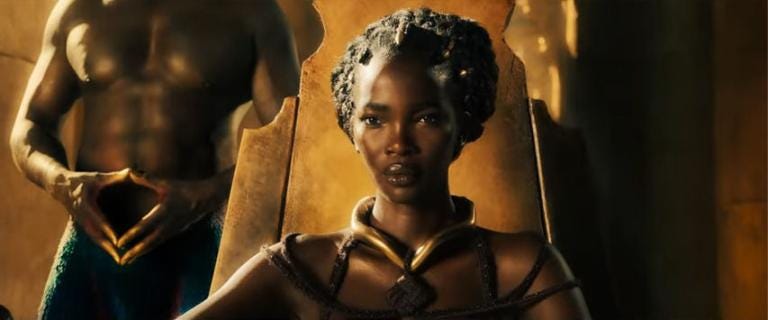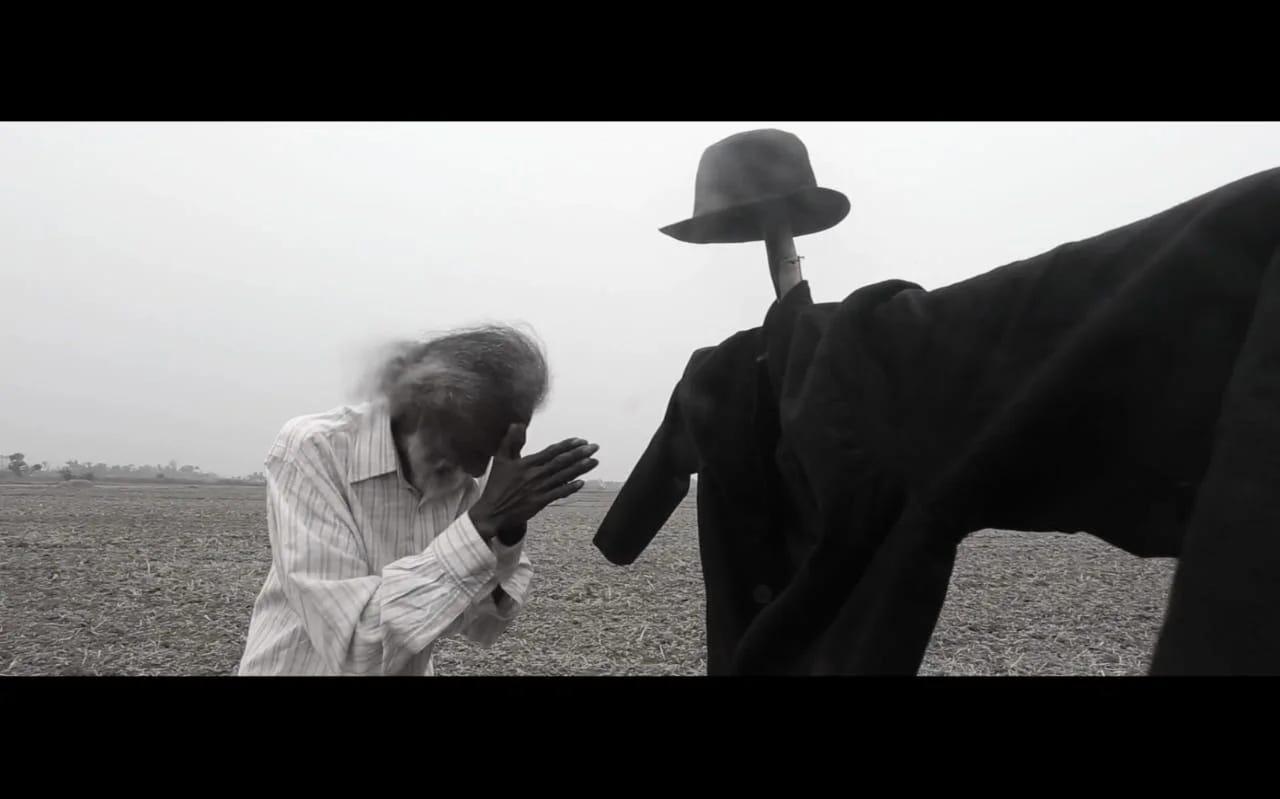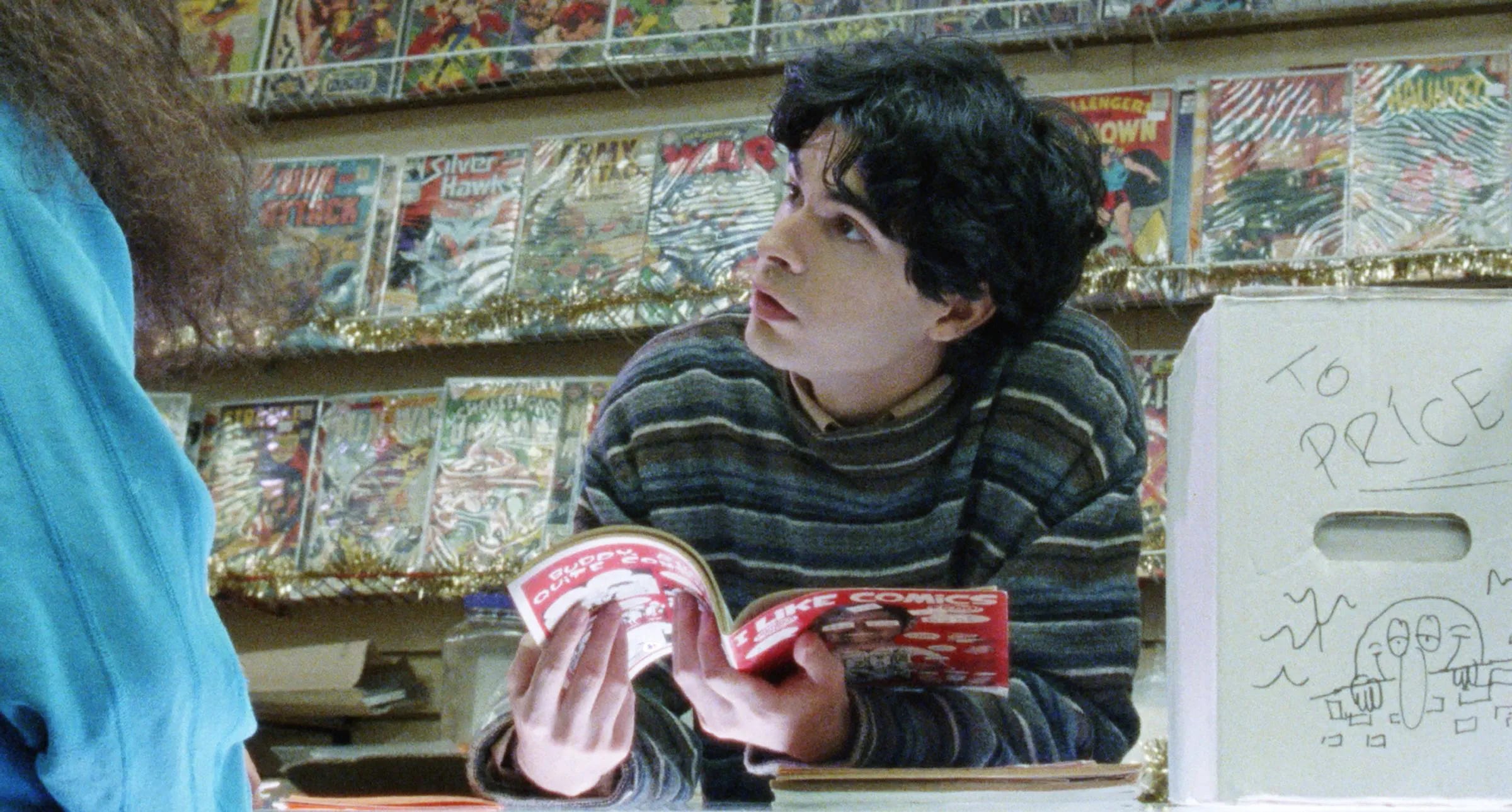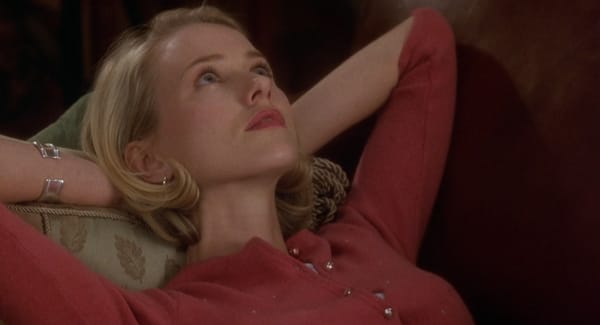What to Watch: Genies and geniuses
"3,000 Years of Longing" leads a round-up of new theatrical and VOD releases

Here’s something interesting: Two of the most unique and strangely satisfying movies of the year to date have both involved a beloved actress of a certain age in a hotel room with a hot co-star talking about love and sex and the whole damn thing. The first was – is – “Good Luck to You, Leo Grande” with Emma Thompson and Daryl McCormack; it’s available exclusively on Hulu and is a fine old thoughtful and randy time. The new one, in theaters today, is a much odder kettle of fish: “Three Thousand Years of Longing” (*** stars out of ****), which stars Tilda Swinton (above right) as a contentedly lonely academic on a working holiday in Istanbul and Idris Elba (above left) as the genie – excuse me, Djinn – she unexpectedly releases from his confinement in an ancient glass bottle. He’s so thankful he offers her three wishes and – well, you know how it goes.
Except you don’t, really. Based on an A.S. Byatt short story (“The Djinn in the Nightingale’s Eye”), the film comes to us from George Miller, one of the premier fantasists of the cinema and the man who gave us “Babe” and the Mad Max movies, including what some have called – okay, what I’ve called – the best movie of the 2010s, “Mad Max: Fury Road.” (He has yet another MM sequel in the works: “Furiosa,” currently in production, is an origin story about the character played by Charlize Theron in “Fury Road” and now by Anya Taylor-Joy of “The Queen’s Gambit.”) “Three Thousand Years of Longing” seems to be a kind of holiday for Miller too – an excuse to amuse himself (and presumably us) with a meditation on storytelling as well as a dive into a series of lavish Babylonian backstories worthy of Cecil B. DeMille.
Swinton’s character, Dr. Alithea Binnie, is a narratologist, an acclaimed professor of the ways we use myth, legends, and fiction to make sense of the world. She’s alarmed to find the Djinn filling her hotel suite with his immense body before shrinking himself down to more manageable size, but she’s not terribly surprised – Alithea has been having visions of late, and even she suspects her new acquaintance may live only in her head. If so, Elba and Miller make him extremely vivid to us, a regal and mournful figure whose parts keep de-substantiating into smoky extremities.

In proper Djinn fashion, he must grant three wishes to be truly free, but there’s a catch: Alithea knows from her studies that the wish-making in these stories always – always – goes wrong, and, besides she has nothing to wish for. (Some of the obvious choices – universal peace and all that – are apparently against the rules.) In despair, the Djinn tells her his own story, or stories, because each of the three times he has been imprisoned in a bottle is a narrative in itself. So from that posh Istanbul hotel room, we are whisked back to the time of the Queen of Sheba (Aamito Lagum, above), the reign of Suleiman the Magnificent (Lachy Hulme), and 19th Century Turkey. These sequences allow the Djinn to revisit his lost loves and relive his heartbreak, and they allow Miller to lay on the special effects and gild the screen in an effulgent CGI glow. The film’s look is very close to kitsch, but it’s the kind of kitsch you want to binge on until you’re stuffed.
By contrast, the war of wits, wills, and emotions in the hotel room is spare to the point of being programmatic – “Three Thousand Years of Longing” is as eccentric in its structure as its content, and it has a fourth act that brings us back to London and just about wears the rubber off the tires. The movie has polarized audiences since it debuted at Cannes in May, yet even with its lumps and misdemeanors, I not only enjoyed it, I prize it and celebrate its existence. It is truly, genuinely original in a time when movie studios profit from telling the same story over and over and over again. It has the courage of its daftness. And Swinton and Elba – that sounds like a law firm, or a high-wire act – play fascinatingly well together, taking most if not all of the sting out of the story’s cliched racial dichotomy. (Your mileage may vary – you know that “magical Negro” Spike Lee talks about? They don’t come more magical than a Djinn.) The two actors’ rhythms couldn’t be more different – hers tart and clipped, his relaxed and majestic – yet those rhythms interlock in ways that are witty and emotionally raw. Alithea and the Djinn are two of the loneliest beings on Earth, and does it matter whether he’s escaped from a bottle or a woman’s imagination? It may be that the only perfect lovers are the ones we wish for.
Quick hits:

“The Territory” (***1/2 stars out of ****) premiered in theaters last week and will come to the National Geographic Channel sometime this fall; keep an eye out for it, as it personalizes what is for most Americans a slow-moving abstract disaster – the destruction of the Amazon rainforest – and turns it into gripping human drama. Alex Pritz’s documentary follows Bitaté, a young activist of the Uru Eu Wau Wau, an indigenous people whose existence only became known to the outside world in 1981. Forty years later, he and his remaining people are fighting a rearguard battle against a relentless encroachment of miners, loggers, and clearcutting farmers. Pritz is evenhanded enough to let the farmers have their say, but his sympathies are clearly with the Uru Eu Wau Wau as they confront the interlopers while raising awareness of the issue in media-savvy ways. Winner of both audience and jury awards at this year’s Sundance, “The Territory” has the pulse of a suspense film and the urgency of a populist drama.

“Adieu Godard” (**1/2 stars out of ****) is an oddly cherubic whatsit out of India, about a rural village elder (Choudhury Bikash, above) whose DVD-porn addiction is interrupted when he accidentally rents “Breathless,” the pioneering 1960 New Wave classic, and becomes enraptured with the work of Jean-Luc Godard. His attempts to mount a Godard festival is met with skepticism from villagers used to Bollywood extravaganzas – Where’s the singing and dancing? Where’s the dashing hero? Meanwhile, it’s possible that this entire storyline is a parable being told by the old man’s daughter (a delightful Sudhasri Madhusmita) to her filmmaker lover (Abhishek Giri), themselves acting out a familiar Godardian tango of hapless male and wise, mercurial female. A specialist item, to be sure, and not all of the movie’s many slapdash levels click into place, but if you’ve got a thing for the aging enfant terrible of French cinema and an adventurous spirit, “Adieu Godard” is making the rounds of art houses and will soon come to the Film Movement streaming platform.

“Funny Pages” (in theaters and on VOD, *1/2 star out of ****) marks a rare misfire for A24, the edgy independent distribution company behind such critical hits as “Lady Bird,” “Midsommar,” and “Everything Everywhere All at Once.” An intentionally abrasive coming-of-age story about a teenage cartoonist (Daniel Zolghadri) striking out on his own in New Jersey, it starts off biliously well, with a brief appearance by playwright Stephen Adly Guirgis (“Between Riverside and Crazy”) as the hero’s foul-mouthed mentor, urging him to “always subvert” before stripping down for a zaftig life-studies drawing session and getting killed off in a car wreck. It’s downhill from there. Cultural reference points include the creators and obsessions of 1990s alternative-comics culture: Daniel “Ghost World” Clowes, Peter Bagge, “Crumb,” Drew Friedman, Joe Franklin. If those names mean nothing to you, no need to bother, and even if they do, the writing and direction by Owen Kline (he played the younger brother in “The Squid and the Whale”) is deadpan slack. The Safdie brothers are credited as co-producers, and the comparison is telling: Their movies about intensely unlikable screw-ups (“Good Times” with Robert Pattinson, “Uncut Gems” with Adam Sandler) have a tautness and drive that keeps you roped in even as you watch through your fingers in dismay.
There’s also “Samaritan” on Amazon Prime, starring Sylvester Stallone as a geriatric superhero – an intriguing premise and I’m always interested in the choices and stratagems of aging movie stars (viz. “Trog,” the final film of Joan Crawford and a most amazing trainwreck) – but they sent the screening link too late, so I’ll get to it next week. Maybe.
Or maybe you’ve got Netflix and just want a flippin’ movie to watch this weekend. If you’ve never seen “Catch Me If You Can” (2002, ***1/2 stars out of ****) or “The Terminal” (2004, *** stars out of ****) – two mid-career Spielbergs that don’t get the love they should—you could do much worse than indulge. Both are about real-life eccentrics, one criminal and the other simply lost; the first stars Leonardo DiCaprio and Tom Hanks and the second stars Tom Hanks and a gallery of familiar actors. The director’s heading into this year’s Oscar season with “The Fabelmans,” his most autobiographical work to date; at 75, he (and we) are starting to look at a storied career in its fullness. “Catch Me If You Can” and “The Terminal” – the only two Spielberg movies on Netflix, more’s the pity – are proof that even the so-called lesser work is damn near bulletproof.
If you enjoyed this edition of Ty Burr’s Watch List, please feel free to share it with friends.
If you’re not a paying subscriber and would like to sign up for additional postings and to join the discussions, here’s how:





